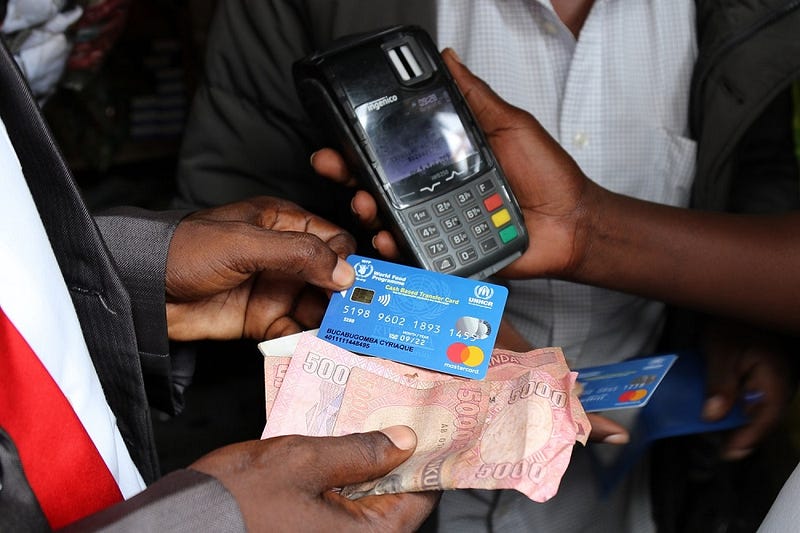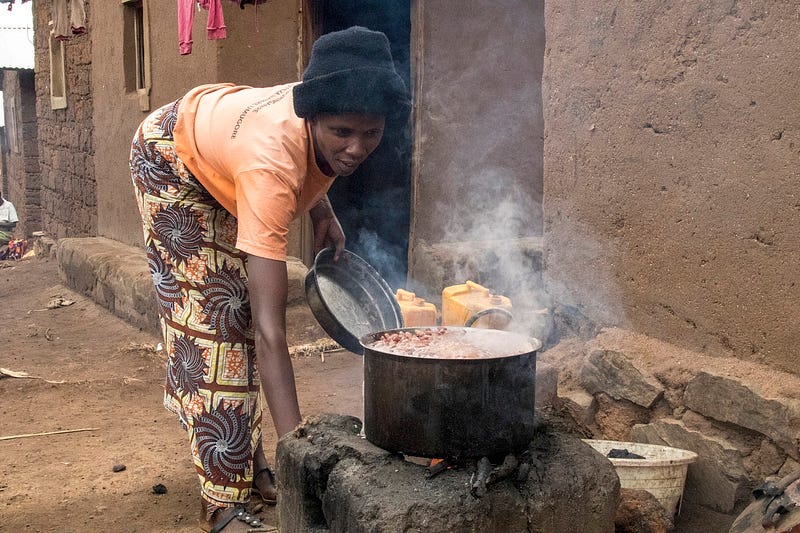The United Nations World Food Programme (WFP) introduced partial cash assistance in Mahama refugee camp in eastern Rwanda in October 2018, thanks to generous funding from the European Commission and other donors. The camp hosts refugees from Burundi, who fled their country following an outbreak of violence during the 2015 elections.
“My wife and children came to Rwanda in early 2015. I stayed behind to monitor the situation, thinking that my family could return to Burundi after a few days,” says 44 year old Cyriaque Bucabugomba, who lives in Mahama camp together with his wife Marie-Rose Nibigira and their four children.
Cyriaque used to own a liquor store in Burundi, as well as three hectares of land and two cows.
“I used to grow coffee, rice, maize and banana, making more than 600,000 Burundian Francs a month (US$ 400).”
As the violence spread in Burundi, Cyriaque had to leave behind everything.
“When I think about my old life I feel very sad. I used to be a successful businessman and now I am living in a refugee camp where I am fully dependent on WFP assistance to feed my family.”
Food assistance through cash transfers
Cyriaque’s family is one of the 150,000 Burundian and Congolese refugees who live in six refugee camps across Rwanda and rely heavily on WFP food assistance every month, as income generating opportunities remain very limited for refugees.

Cyriaque withdrawing familiy’s monthly cash from a bank agent in Mahama camp. He uses the cash provided by WFP to purchase food for his family. Photos: WFP/Noel Dukuzumuremyi
In October 2018, WFP in collaboration with its cooperating partners, introduced partial cash assistance for Burundian refugees living in Mahama camp. Each refugee receives RWF 5,400 per person/month (US$ 6 dollars), enabling them to buy the food of their choice at local markets.
To ensure that the Burundian refugees continue to receive a nutritious balanced diet, WFP provides them with partial in-kind food assistance as well. In addition to the cash, Burundian refugees receive 5.1 kg of fortified corn soya blend (CSB+) and beans every month.
“Since we started receiving cash assistance from WFP, the family is eating the same food again like we used to eat in Burundi: potatoes, vegetables and bananas. It gives a taste of home,” explains Marie-Rose Nibigira, Cyriaque’s wife.
Power of choice
The cash assistance provided by WFP allows people to decide what they want to eat and buy food that they did not receive before, such as vegetables and meat, thereby diversifying their diet.
“The food we used to receive was limited to maize, beans, corn soya blend, vegetable oil and salt, but with the cash assistance we can now buy the foods and quantities we like and even cover some other urgent expenses,” says Cyriaque. “I even managed to save some money to buy meat for the family during Christmas,” he says with a big smile.

Marie-Rose cooking family dinner at in Mahama camp. Photo: WFP/Noel Dukuzumuremyi
Enabling Business environment
A study conducted in 2015 by a team of researchers from the World Food Programme and the University of California, Davis, provides evidence that assistance for refugees has a positive effect on the local economy where they live — an effect that is magnified significantly when the refugees’ food assistance comes in the form of cash. Each US$ provided through cash assistance to refugees living in refugee camps in Rwanda provides a US$ 1.51 — US$ 1.95 injection into the local economy for general food assistance.
An estimated RWF 306 million (USD 350,000)is injected into the local economy every month. More than 100 new food stores have been established in Mahama camp since the cash programme was introduced in October 2018, as well as 19 new bank agents, employing hundreds of people. Bank agents function as small bank outlets and facilitate the cash transfer from the bank to the refugee’s debit card.
One of the people whose business has greatly benefited is Joseline Uwimana , a mother of four children who is originally from Kirundo, Burundi. She started selling vegetables in 2017 from the little money she earned as a casual labourer for humanitarian agencies in Mahama camp.
Joseline estimates her small business has grown by 50 percent in the past three months.
“People are buying more vegetables than before. I serve over 100 clients every day, while I used to have less than 50 customers before the cash assistance was introduced,” says Joseline.

Joseline selling different food commodities at one of markets in Mahama camp. Photo: WFP/Noel Dukuzumuremyi
Jean de Dieu Ruberintwari is one of the largest traders in Mahama camp. He left his business in Burundi when he had to leave the country in 2015. With the little money he had left upon his arrival in Rwanda, he started selling maize and maize meal outside Mahama camp together with his wife and six children.
With the introduction of cash assistance and the cash injection into the local economy, Jean de Dieu opened a food store inside the camp where he sells beans, maize and maize meal and transacts money as well.
“Within five days, I managed to sell 22 metric tonnes of maize meal,” says Jean de Dieu. “I earned 30 percent more compared to the time before WFP introduced cash assistance.”
With the introduction of cash assistance in Mahama camp, all Congolese and Burundian refugees living in six refugee camps across Rwanda are now receiving cash assistance from WFP. By the end of 2019, in-kind food assistance will be discontinued completely in the camps.
In addition to unconditional cash assistance, WFP also provides specialized in-kind nutritious foods to vulnerable groups, such as young children, pregnant and nursing mothers and people living with tuberculosis or HIV/AIDS, in order to prevent and treat malnutrition. Daily school meals are provided to school aged refugee children as well as children from host communities that are attending the same schools in and around the camps.
This year, WFP plans to start to facilitate livelihoods and self-reliance of refugees by supporting activities for productive asset creation and durable solutions.
WFP’s top five donors for food assistance to refugees in 2018 were USA-FFP, European Commission, Canada, UN CERF and multilateral donors.











